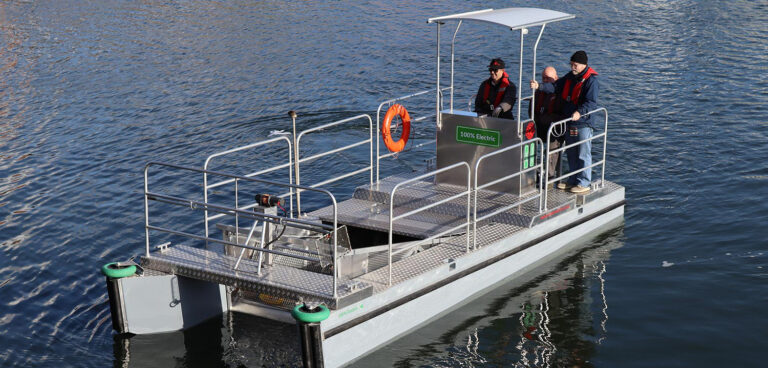It’s estimated that 300 million tons of plastic have entered waters around the globe since the 1940s, harming marine life and damaging ecosystems on which humans rely. Harbors are often the last opportunity to intercept plastic before it enters the ocean, where it is much more difficult to remove.
To address this issue, UK company Water Witch has been building specialized cleanup boats for over 50 years. The Liverpool-based boatbuilder has now announced that Torqeedo electric power is to be offered as a replacement for the standard four-stroke outboards on its range of Versi-Cat litter collection craft and pontoon workboats.
“This is a clean, green, safe, zero-emission solution with long life, low maintenance and minimal operating costs,” said Water Witch director Jackie Caddick.
The Torqeedo propulsion package consists of a Cruise 10.0 outboard coupled with two Power 48 intelligent lithium-ion batteries weighing 36kg each. A cockpit control panel gives the operator a view of system status, including range at current speed. The system delivers six to eight hours of service between charges.
“From high-end marinas to commercial harbors and even hydro-electric dams, the environmental benefits of a completely zero-emission solution have really sparked interest,” said Caddick.
“In fact, many of our owners are also enquiring about converting their existing vessels to an all-electric drive. Retrofitting is very easy, basically just a straight swap. It’s a very cost-efficient option, and backed by the support of Torqeedo’s extensive worldwide warranty and after-sales support.”
This year, Water Witch is also introducing a new, larger 8.0m boat to its Versi-Cat series with Torqeedo electric power as standard fit. The new model has traditional hull shape, which is designed to improve transit speeds to 10-11kts using the same propulsion as existing vessels, and provide better seaworthiness for operating in coastal waters.
Caddick believes that electric power will be the future for all of its vessels: “Clients are increasingly looking toward green technology to support their water and waste management services, reduce their dependence on fossil fuels and create a better environment for their own stakeholders. It just makes good sense that a boat working to clean up pollution should not add to the problem by causing pollution in the water or through emissions.”



